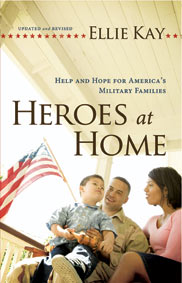Heroes at Home - Fighting for Financial Freedom
Today, we have a special guest blogger, Ellie Kay, who is the founder of Heroes at Home, a 501(c)(3) dedicated to helping military families and all Americans find financial freedom.
"How would you like to live debt free?" Ellie asks. "Even as we celebrate Independence  Day and the men and women who keep our nation stay free, we also can become financially free."
Day and the men and women who keep our nation stay free, we also can become financially free."
I (Dawn) believe there are many kinds of freedom we can experience as members of the family of God. Financial freedom is one kind of freedom that can affect your family, career and even how you give to ministy! God wants you to be a wise, intentional and cheerful giver (Proverbs 21:20a; 2 Corinthians 9:7), and one way to do that is to operate out of financial freedom!
Ellie continues . . .
In my work helping service members with financial readiness, there are tips that apply to everyone.
1. Credit Credibility
No matter what your financial picture is, it’s critical for every person to improve her own FICO (Fair Isaac Credit Scores). These scores determine not only the APR you pay on a home or car loan, but they also impact auto insurance premiums, whether you’ll get the promotion or the job (many employers check FICOS), whether you pay a security deposit for utilities, and much more.
You can go to Credit.com to check your score and they’ll even give you specific ways to improve each area of your credit score.
You can improve your FICO in three easy steps:
- Pay early – Set up automatic payments online so you will never be late.
- Pay More - Add $5 to $10 more than the minimum balance that is due; this indicates you are paying down debt.
- Pay Proportionally – Also known as credit utilization—make sure you don’t have more than 30% of the available credit charged on any one card at any time. For example, a card with a $5000 limit should never have more than $1500 charged.
2. Savings Savvy
It only takes 15 minutes to save hundreds of dollars! Once you save money in one area, use those funds to pay down consumer debt or to build up a savings account.
- Auto Insurance – Once a year, compare policies by getting a variety of quotes. Take the cheaper price back to your existing provider and tell them you will switch companies unless they can match the price. (Be sure to check out quotes from USAA.com if you are military and qualify to be a member.)
- RetailMeNot – If you have a smart phone, download the RetailMeNot app or bookmark it on your computer. This is a code site that offers 400,000 coupon codes at any given time. Just enter the store’s name and you’ll see all the codes to get the better prices. Use this on entertainment, travel, electronics and any kind of online shopping or in the mall.
- CouponMom.com – I was one of the original extreme couponers and it’s served me well all these years. If you go to this site, she’s done all the work for you and will tell you what is on sale in your neighborhood, what codes are available, what coupons are out for the item and which stores double coupons. I calculated that over the course of twenty years, I saved our family over 160K!
3. Debt Deal Dilemma
With a slow economy comes an influx of those who want to "help" prepare you for the worse by consolidating your debt. However, most “for profit” debt-counseling companies charge a hefty fee for their services, which is usually tacked onto your debt load.
Instead, go to the National Consumer Credit Counseling Service at www.nfcc.org and use their free services.
4. Budget Baby
If you don't have a budget—as part of your lifestyle—then yesterday was the day to start! Set one up with online budgeting tools, found at mint.
The problem for a lot of families is not having a budget, it’s sticking to a budget.
Set up a “budget date” once a month with your spouse to revisit how the plan is working.
This kind of regular accountability works as well in finances as it does in Weight Watchers. When you know there will be someone asking you why you bought that purple mohair sweater for $198, you’re less likely to give into the impulse to go off budget.
Can you celebrate your "Financial Freedom" today? If not, which of Ellie's tips might help you claim your independence?
A special JULY 4th note:
During this time of the year, be sure to thank those heroes at Heroes at Home ... thank them for their service. [For more information on where Ellie Kay’s Heroes at Home is visiting next, explore their website at HeroesAtHome.org.]
Ellie Kay is the best-selling author of fifteen books including Lean Body, Fat Wallet, and Heroes at Home. She is a Toastmaster Accredited Speaker as  well as a popular international speaker and media veteran who has given over1,200 media interviews including appearances on ABC, CNBC, CNN and Fox News. As a popular columnist, she writes for six national magazines and has been a Subject Matter Expert for the Wall Street Journal, New York Times and Washington Post. Currently, Ellie provides financial education to military members through her “Heroes at Home Financial Event” sponsored for USAA. Ellie is married to LTC Bob Kay and they have seven children.
well as a popular international speaker and media veteran who has given over1,200 media interviews including appearances on ABC, CNBC, CNN and Fox News. As a popular columnist, she writes for six national magazines and has been a Subject Matter Expert for the Wall Street Journal, New York Times and Washington Post. Currently, Ellie provides financial education to military members through her “Heroes at Home Financial Event” sponsored for USAA. Ellie is married to LTC Bob Kay and they have seven children.
Graphic adapted, courtesy of Morguefile.
 Post a Comment → Posted on
Post a Comment → Posted on  Monday, July 4, 2016 at 9:00AM
Monday, July 4, 2016 at 9:00AM  Budgeting,
Budgeting,  Credit,
Credit,  Debt,
Debt,  Ellie Kay,
Ellie Kay,  Finances,
Finances,  Financial Freedom,
Financial Freedom,  Financial Wisdom,
Financial Wisdom,  Heroes at Home,
Heroes at Home,  Savings,
Savings,  Upgrade with Dawn Upgrade Your Life
Upgrade with Dawn Upgrade Your Life  Finances
Finances 






